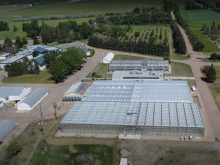Leaders of the G8 group of developed economies pledged to conclude the seven-year-old round of world trade talks by the end of next year.
At the July 10 close of the three-day summit in Italy last week, chair and Italian prime minister Silvio Berlusconi said a liberalizing trade agreement is needed to help pull the world out of recession.
WTO director general Pascal Lamy immediately hailed the commitment as good news, even as he announced that merchandise trade is expected to fall 10 percent this year, 14 percent in developing countries.
Read Also

Alberta crop diversification centres receive funding
$5.2 million of provincial funding pumped into crop diversity research centres
He said he will convene a meeting of involved trade and agriculture ministers before a meeting of 20 country leaders in Pittsburg Sept. 24-25 and will report to the G20 meeting on plans to revive the talks that have been stalled for the past year in part over agricultural disputes.
G8 leaders have made similar pledges of support for an end to the WTO talks in previous years and that has led to some skepticism about last week’s promise.
“Hope springs eternal but the divisions remain and are perhaps deeper than they were last July, and this is but another target,” said Ottawa trade consultant Peter Clark. “So while we must be hopeful, my experience makes me dubious.”
“I’ve heard this before and it came to naught,” Liberal agriculture critic Wayne Easter said July 13. “I don’t think this will have much effect.”
Meanwhile, G8 leaders, including Canadian prime minister Stephen Harper, were joined by more than a score of other country leaders and international agencies to promise $20 billion US over three years for investment in developing world agriculture and food security.
Harper said Canada’s share will be $1.18 billion over three years, a $600 million increase.
“Whether we are talking about famines, price spikes or lack of sustainable agricultural development, there are many clear and compelling humanitarian, economic and security reasons to address this mounting global challenge today,” he said in a statement from the conference site at L’Aquila, Italy.
Canada, which recently made food security one of the key aims of its international development program, said it will use what it contributes to fund single country bilateral investments and multilateral programs delivered by organizations.
But an international farm leader says governments should not be doling out the money directly.
Ajay Vashee from Zambia, president of the International Federation of Agricultural Producers, said governments should make the money available to developing country farm organizations that then would determine their best use.
“Investment should not be done the same way as in the past,” he said.
“Investment must be focused on farmers, especially small-hold farmers, both men and women, since they are at the heart of the solution to world food security.”














